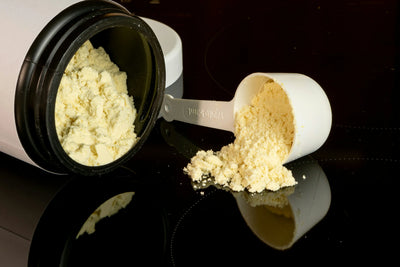Introduction
Parents who own dogs know that sometimes dogs will scratch non-stop due to skin problems, even causing themselves numerous injuries. Steroid creams, such as the commonly used hydrocortisone cream, are recommended by many veterinarians as topical medications. They can quickly relieve the itching, redness, and inflammation of dogs, making the furry companions feel more comfortable.
Steroid Cream for Dogs: Safe Usage, Side Effects & Veterinarian Tips
However, this "miraculous ointment" is not a panacea. If used improperly, it may cause side effects and even affect the dog's health. Today, let's talk about how to use steroid cream correctly, what side effects to be aware of, and the practical suggestions given by veterinarians to help you better take care of your dog's skin health.

1. How Does Steroid Cream "Save" A Dog's Skin?
The "magic" of steroid cream lies in its ability to quickly suppress the inflammatory response of a dog's skin. Whether it's eczema, allergic dermatitis, or redness, swelling and itching caused by mosquito bites, it can all be of use. In simple terms, steroids reduce the local immune response of the skin, alleviate redness, swelling and itching, and prevent the dog from constantly scratching.
However, parents should understand that steroid cream is merely a temporary solution that addresses the symptoms rather than the root cause. It can make the dog feel better temporarily, but it cannot cure the underlying causes of skin problems, such as food allergies, parasitic infections, or environmental factors. Therefore, when using steroid cream, it is crucial to understand its correct usage and limitations.
2. How to Use Steroid Cream Safely? These Details Cannot Be Ignored!
Using steroid cream correctly not only helps alleviate your dog's skin problems but also minimizes the risk of side effects. Here are some practical usage guidelines:
(1) Choose the appropriate steroid cream for dogs
Appropriate concentration: The 1% hydrocortisone cream commonly available on the market is a relatively safe choice, with a low concentration that is suitable for dogs' sensitive skin. Creams with higher concentrations may have stronger effects, but they also carry higher risks of side effects. They should be used under the guidance of a veterinarian.
Safe ingredients: Try to choose creams with simple ingredients, without fragrances or irritating additives. Fragrances or chemical additives may make the dog's skin feel more uncomfortable and even trigger allergies.
(2) Apply correctly to prevent accidental ingestion
Precise application: When using the steroid cream, only take a small amount (about the size of a soybean), gently apply it to the red and swollen or itchy skin of the dog, and gently massage it until it is absorbed. Do not apply it over a large area to avoid excessive medication.
Prevent licking: Dogs have a natural tendency to lick, and licking the steroid cream may cause gastrointestinal discomfort. After applying the cream, you can put an Elizabethan collar on the dog or use a toy to distract it to ensure the cream is absorbed by the skin.
Control frequency and duration: Generally, it is recommended to apply once or twice a day, and use it for no more than 7 days continuously. If a longer period is needed, be sure to consult a veterinarian to avoid risks associated with long-term use.
(3) The veterinarian is your "brain trust"
Each dog's constitution and skin problems are different. Steroid creams are not suitable for all dogs. Before using them, take your dog to the veterinarian for an examination to determine the cause of the skin problem and obtain targeted medication advice. The veterinarian may recommend an appropriate cream concentration and usage plan based on the dog's age, weight, and health condition.
3. Side Effects of Steroid Creams: Be Alert to These Risks
Although steroid creams can quickly alleviate a dog's discomfort, they are not without their "temper". Improper use or prolonged use may cause the following side effects. Parents need to be particularly vigilant:
(1) Short-term side effects
Skin thinning: Long-term use of steroid cream may make a dog's skin fragile, prone to abrasions or infections, especially in sensitive areas such as the abdomen or near the ears.
Immune suppression: Steroids temporarily suppress local immune responses, making the skin more susceptible to bacterial, fungal or viral "invasions", leading to secondary infections.
Gastrointestinal discomfort: If a dog accidentally licks the ointment, it may experience vomiting, diarrhea or loss of appetite.
Behavioral changes: A small number of dogs may become restless, anxious, or appear drowsy after using steroids. These changes are usually temporary, but if they persist, medical attention should be sought promptly.
(2) Long-term side effects
Diabetes risk: Long-term use of steroids may interfere with a dog's blood sugar regulation, increasing the risk of diabetes, especially in senior dogs or those with a family history of diabetes.
Adrenal problems: Long-term use may lead to hyperfunction of the adrenal cortex, manifested as increased water intake, increased urination, weight gain, and even hair loss. These symptoms, once present, require immediate cessation of medication and medical attention.
4. Vet's Wise Advice: Keep Your Dog Away from Skin Problems
Veterinarians often say that steroid creams are like a "double-edged sword". When used properly, they can be a lifesaver; but if used improperly, they can cause problems. Here are a few practical suggestions given by the veterinarians:
(1) Short-term use, treating symptoms but not the root cause
Steroid creams are suitable for temporarily alleviating acute skin problems, such as sudden itching or redness and swelling. However, if the dog's skin problems recur frequently, do not rely solely on the ointment. Take the dog for a comprehensive examination to identify the underlying causes such as allergens, parasites, or infections. Only by addressing the root causes can the dog truly regain its health.
(2) Try more gentle alternative therapies
For mild skin problems, parents can try some natural care methods:
Oatmeal bath: The bath solution made with warm water and oatmeal powder can soothe the itching of a dog's skin, being gentle and non-irritating.
Coconut oil: Applying a moderate amount of coconut oil can moisturize the skin, alleviate mild inflammation, and is safe and non-toxic to dogs.
Medicated bath: The veterinarian may recommend medicated bath products with antibacterial or antifungal properties, which are more effective for specific skin infections.
If the skin problem is severe, the veterinarian may prescribe antibiotics, antihistamines, or immunomodulators. These drugs may be more suitable for long-term management than steroids.
(3) Close observation and timely adjustment
During the use of steroid cream, parents should act as "detectives" and constantly monitor their dogs' reactions. If any abnormalities are noticed, such as persistent vomiting, decreased appetite, abnormal behavior, or worsening skin problems, stop the medication immediately and contact a veterinarian. Regular rechecks can also help assess the treatment effect and adjust the plan.
Steroid creams (such as 1% hydrocortisone cream) are excellent tools for treating skin problems in dogs. They can quickly relieve itching, redness, and inflammation, reducing the suffering of the furry friends. However, they are not a "panacea". When using them, it is necessary to carefully choose low-concentration products, strictly follow the veterinarian's instructions, control the frequency and duration of use, and prevent the dogs from licking the medication. Long-term use may pose risks such as skin thinning, immune suppression, and endocrine problems. Therefore, parents should closely monitor the health changes of their dogs.
More importantly, skin problems are often just the "tip of the iceberg". If your dog keeps scratching repeatedly or the skin problem persists despite treatment, don't just rely on steroid creams. Take your dog to the veterinarian to find out the cause, which could be food allergies, flea infections, or environmental factors at play. Combining natural remedies, medication treatment, and daily care can help restore your dog's skin to health and allow it to wag its tail happily again!
Natural Steroid for Dogs: 5 Plant-Based Alternatives to Avoid Side Effects
As the parents of dogs, seeing our furry companions suffering from joint pain, skin itching or allergies always makes us feel extremely sad. Although steroid drugs (such as prednisone) can quickly alleviate these problems, long-term use may cause side effects, such as weakened immunity, increased risk of diabetes, and even the development of Cushing's disease. More and more pet owners are turning to natural remedies, hoping to safeguard their dogs' health in a gentler way. Here, we have compiled five natural steroid alternatives derived from plants for you, to help relieve your dog's discomfort while minimizing side effects. Come and take a look at these "gifts" from nature together!
1. Natural Steroid Alternatives: Gentle and Effective
These plant-based natural remedies not only help alleviate inflammation and pain in dogs, but also reduce the burden on their bodies. Here are five alternatives worth trying, suitable for dealing with common issues such as arthritis, allergies, or skin problems:
(1) Yucca Schidigera: The Anti-inflammatory "Super Herb" in the Desert
Yucca Schidigera is a medicinal plant that grows in the deserts of Mexico. It is highly regarded for its anti-inflammatory and anti-arthritis properties. It contains natural steroid saponins that stimulate the body of dogs to produce corticosteroids, providing an anti-inflammatory effect similar to that of corticosteroids, but more gentle. Whether it's arthritis, hip joint dysplasia, or skin itching caused by allergies, Yucca Schidigera can be of great use.
Usage instructions: Yukagen is usually sold in powder or tablet form, making it easy to incorporate into your dog's regular diet. The recommended dosage is 1/2 teaspoon of dried root powder per pound of body weight (approximately 2.5 milligrams). It can be sprinkled on the dog food or mixed into the wet food.
Notes: Although Yukagun is beneficial, it should not be used in excessive amounts or continuously for an extended period to avoid irritating the dog's digestive tract. If the dog has a history of gastrointestinal sensitivity, it is advisable to consult a veterinarian before use to determine the appropriate dosage and treatment duration.
(2) Curcumin: The Golden Anti-inflammatory "Star"
Curcumin is the active ingredient in turmeric and is renowned for its powerful anti-inflammatory and antioxidant properties. It can effectively alleviate symptoms of inflammatory diseases such as arthritis and allergic dermatitis, and also helps dogs combat oxidative stress and protect cellular health. For dogs with stiff joints or swollen skin, curcumin is a gentle and natural choice.
Usage instructions: Choose a gingerol supplement specifically designed for pets. Usually, black pepper extract (Piperine) is added to enhance absorption. The daily dosage should be adjusted according to the dog's weight and the product instructions. It is recommended to start with a small dose and observe the dog's reaction.
Notes: The absorption rate of curcumin is relatively low and the quality varies. When purchasing, choose a reliable brand and ensure that the product does not contain artificial additives. If your dog is currently taking other medications, consult a veterinarian to avoid possible interactions.
(3) Omega-3 Fatty Acids: Anti-inflammatory "Guardians" from the Ocean
Omega-3 fatty acids (such as EPA and DHA) are natural "masters" in fighting inflammation. They are commonly found in fish oil and flaxseed oil. They can effectively reduce inflammation caused by arthritis, skin itching, and allergies, and promote the health of a dog's skin and hair. For senior dogs or those with chronic inflammation, Omega-3 is an indispensable nutritional supplement.
Usage instructions: Choose high-quality fish oil supplements and prefer brands that have undergone purification processes to ensure they do not contain heavy metals or other contaminants. Feed according to the recommended dosage on the product packaging, usually calculated based on the dog's weight (approximately 100-150 milligrams of EPA/DHA per 10 pounds of body weight).
Notes: Excessive intake of omega-3 may cause digestive problems or diarrhea. Therefore, the dosage should be strictly controlled. Flaxseed oil is suitable for dogs in vegetarian households, but its conversion efficiency is relatively low and the effect may not be as obvious as that of fish oil.
(4) Probiotics: The "Revolution" Starting from the Gut
You might not expect that a healthy gut microbiota can also help dogs fight inflammation! Probiotics improve the intestinal microecology and enhance the immune system function, thereby indirectly reducing systemic inflammatory responses. For dogs with food allergies, skin problems, or chronic inflammation, probiotics are a gentle and long-term effective option.
Usage instructions: Choose a probiotic product specifically designed for dogs, which can be in powder, capsule or chewable form. Mix it into the food and feed it to the dog. Use the dosage as specified on the product label. Usually, it is done once a day for several weeks to observe the effects.
Notes: The effects of probiotics take time to accumulate and may not be noticeable in the short term. When purchasing, make sure the product contains multiple strains (such as lactobacillus and bifidobacterium), and check if it is suitable for the dog's constitution. If the dog has serious intestinal problems, it should be used under the guidance of a veterinarian.
(5) CBD Oil: The Natural "Relaxant" for the Mind and Body
CBD oil (cannabidiol) has become a popular choice in pet care in recent years. By interacting with the endogenous cannabinoid system in dogs' bodies, it exerts anti-inflammatory, analgesic and anti-anxiety effects. Whether it's pain caused by arthritis, itching of the skin, or scratching due to stress, CBD oil can provide assistance.
Usage instructions: Choose high-quality CBD oil specifically designed for pets, ensuring it is THC-free (THC, tetrahydrocannabinol, can make dogs "high"). Feed according to the recommended dosage on the product label. Usually, it is administered by dripping directly into the dog's mouth or mixed into the food.
Notes: The safety of CBD oil varies by brand. Before purchasing, make sure the product has been tested by a third party to ensure purity and safety. Before use, consult a veterinarian, especially if the dog has liver or kidney problems or is taking other medications.

2. Summary: Protecting Dog Health with Natural Forces
Compared to traditional steroid drugs, natural alternatives derived from plants such as Yukagen, curcumin, omega-3 fatty acids, probiotics, and CBD oil can alleviate dogs' inflammation, pain, and discomfort in a more gentle manner, significantly reducing the risk of side effects. These natural treatments are not only effective for conditions like arthritis, allergies, and skin problems, but also enhance the overall health of dogs, allowing them to wag their tails with more vigor.
However, being natural does not mean "use at will". Each dog has different physical conditions and health statuses, so the suitable treatments and dosages will also vary. Before trying these alternatives, it is recommended to take your dog to the veterinarian for a comprehensive examination to understand the root cause of the problem and choose appropriate products and usage plans based on the veterinarian's advice. When purchasing, choose high-quality and reliable brands, strictly follow the product instructions, and ensure the dosage is accurate.
By using the gentle power of nature instead of potentially risky steroid drugs, not only can dogs feel more comfortable, but parents can also feel more at ease. May every furry friend be able to say goodbye to itching and pain and regain the joy of playing freely!
Natural Pain Relief for Dogs: Fast-Acting Remedies for Arthritis & Post-Surgery
As the parents of dogs, seeing our furry companions in great pain due to arthritis or post-operative recovery always makes us feel extremely sad. Although traditional painkillers work quickly, long-term use may cause side effects, such as gastrointestinal discomfort or burden on the liver and kidneys. More and more pet owners are now seeking natural pain relief methods, hoping to help their dogs regain vitality in a gentler way. This article will introduce eight fast-acting natural pain relief therapies specifically designed for arthritis and post-operative recovery, allowing dogs to wag their tails again in comfort!

Noora Daily Multi with 21 Beneficial Nutrients
1. Natural Pain Relief Methods: Gentle and Effective
These natural pain relief methods not only alleviate the pain and inflammation in dogs, but also reduce the burden on their bodies. Whether it's chronic pain from arthritis or temporary discomfort after surgery, the following eight treatments can all be of use:
(1) Curcumin: The Golden "Painkiller Star"
Curcumin is the active ingredient in turmeric and is renowned for its powerful anti-inflammatory and analgesic effects. Studies have shown that it can effectively alleviate pain and swelling caused by arthritis, and also help dogs recovering from surgery reduce inflammatory responses. Curcumin is like a "painkiller" bestowed by nature, being gentle and friendly to the body.
Usage instructions: Choose a gingerol supplement specifically designed for pets. Usually, black pepper extract (Piperine) is added to enhance absorption. Follow the product instructions to feed according to the dog's weight. It is recommended to start with a small dose and observe the reaction before making any adjustments.
Notes: Curcumin has a relatively low absorption rate. When purchasing, choose high-quality products without additives. If your dog is currently taking other medications, consult a veterinarian to avoid any interactions.
(2) Omega-3 Fatty Acids: The "Anti-Inflammatory Guardians" of the Ocean
Omega-3 fatty acids (EPA and DHA) are found in fish oil and flaxseed oil and are natural anti-inflammatory experts. They can effectively reduce stiffness and pain caused by arthritis, and at the same time accelerate the healing of post-operative wounds. For senior dogs or those with chronic inflammation, omega-3 is an indispensable nutritional support.
Usage instructions: Choose a high-quality fish oil supplement and ensure it is free from heavy metal contamination. For small dogs, supplement with 100-200 milligrams of EPA/DHA per day. For large dogs, 300-500 milligrams are required. It can be mixed into the food for feeding.
Notes: Excessive use may cause diarrhea or digestive problems. Please strictly follow the recommended dosage. Flaxseed oil is suitable for vegetarian households, but its conversion efficiency is relatively low and the effect may be slightly inferior.
(3) Probiotics: The "Health Revolution" Starting from the Gut
A healthy gut is the foundation of a dog's overall health. Probiotics optimize the intestinal flora, enhance the immune system, and indirectly reduce systemic inflammatory responses. This is particularly beneficial for dogs with arthritis or those recovering from surgery, as it can alleviate discomfort at its root cause.
Usage instructions: Select a pet-specific probiotic product (in powder, capsule or chewable form), and feed it once or twice a day by mixing it into the food. Adjust the dosage according to the product instructions. Generally, for small dogs, 1 capsule per time; for large dogs, 2 capsules per time.
Notes: Probiotics require consistent use over an extended period to be effective. When choosing a product, make sure it contains multiple strains (such as lactobacilli and bifidobacteria). If your dog has severe intestinal problems, it is necessary to use it under the guidance of a veterinarian.
(4) CBD Oil: The "Natural Calming Agent" for Relaxing the Body and Mind
In recent years, CBD oil (cannabidiol) has become a popular choice in pet care. By interacting with the endogenous cannabinoid system of dogs, it alleviates joint pain, post-operative discomfort, and anxiety. Whether it's chronic pain or post-operative recovery, CBD oil can make dogs feel more comfortable.
Usage instructions: Select pet-specific CBD oil without THC. For small dogs, use 1-2 drops per day. For large dogs, use 3-5 drops. The oil can be administered orally or mixed into food. Start with a low dose and observe the effect before adjusting.
Notes: Before purchasing, confirm that the product has been tested by a third party to ensure purity and safety. Before use, consult a veterinarian, especially if the dog has liver or kidney problems or is currently taking medication.
(5) Glucosamine and Chondroitin: The "Repair Masters" of Joints
Glucosamine and chondroitin are the "golden pair" for treating arthritis. They can repair and protect the joint cartilage, alleviate pain and inflammation. For dogs recovering from surgery, this combination can also promote the healing of soft tissues and accelerate their recovery.
Usage instructions: Select a pet-specific glucosamine and chondroitin supplement. For small dogs, take 250-500 milligrams per day; for large dogs, take 500-1000 milligrams per day. Mix it into the food and feed it to the pet.
Notes: The effects will accumulate over several weeks. Long-term use should be carried out under the guidance of a veterinarian to ensure safety of dosage and treatment duration. Some dogs may be allergic to the sources of chondroitin (such as shellfish), so caution is necessary.
(6) Cold and Hot Compresses: A Simple and Effective "Home Therapy"
Cold and hot compresses are a cost-effective and quick-acting pain relief method, suitable for arthritis and post-operative recovery. Cold compresses can reduce inflammation and swelling, while hot compresses promote blood circulation and relieve muscle tension.
Usage instructions: For cold compress, use an ice pack or cold compress bag and apply it to the painful or swollen area for 15-20 minutes, 3-4 times a day. For hot compress, use a hot compress bag or warm towel and apply it for the same duration (15-20 minutes), 3-4 times a day. Ensure the temperature is moderate and avoid burns or frostbite.
Notes: Before applying, wrap the area with a towel to protect the dog's skin. If the wound is not healed after the procedure, use cold compress first and consult a veterinarian.
(7) Massage: The Gentle "Healing Hands"
A gentle massage can relieve your dog's muscle tension, enhance blood circulation, and alleviate arthritis or post-operative pain. Each massage session also strengthens the bond between you and your dog, making it feel at ease.

Usage instructions: Gently massage the painful area with a gentle circular motion. Each session should last for 10 to 15 minutes. You can also use natural coconut oil to enhance lubrication for better results.
Notes: The massage should be gentle and avoid pressing on the painful area. If the dog shows any discomfort, stop immediately and consult a veterinarian.
(8) Acupuncture: The "Modern Application" of Ancient Wisdom
Acupuncture, as a traditional Chinese medical therapy, alleviates pain and inflammation by stimulating specific acupoints. It is particularly suitable for dogs with chronic arthritis or those recovering from surgery. It can promote the body's self-healing process and improve the mobility of the dogs.
Usage instructions: Acupuncture should be performed by a professional veterinarian. Each session lasts 30 to 60 minutes, and it is recommended to have 1-2 sessions per week. The treatment course varies depending on the dog's condition and usually shows improvement after several sessions.
Notes: Choose a qualified veterinarian to ensure the safety of the acupuncture process. The acceptance of acupuncture by dogs varies from one individual to another, and patience is required for observation.
Curcumin, omega-3 fatty acids, probiotics, CBD oil, glucosamine and chondroitin, cold and hot compresses, massage and acupuncture - these natural pain-relieving methods provide gentle and effective options for dogs with arthritis and post-operative recovery. Compared to traditional painkillers, they have fewer side effects and can improve the health of dogs from multiple angles, allowing them to regain their vitality.
However, each dog has a different constitution and pain cause, so natural remedies are not a one-size-fits-all solution. Before trying these methods, take your dog to the veterinarian for a comprehensive examination to confirm the cause and obtain personalized advice. When choosing supplements, select high-quality, reliable brands and strictly follow the product instructions or the veterinarian's recommended dosage. Whether it's simple cold or hot compresses or professional acupuncture, closely observe the dog's reaction. If any discomfort occurs, promptly adjust the plan.
Using the gentle power of nature, help dogs get rid of pain and regain the joy of playing freely. May every furry friend enjoy every pain-free day in love and care!





